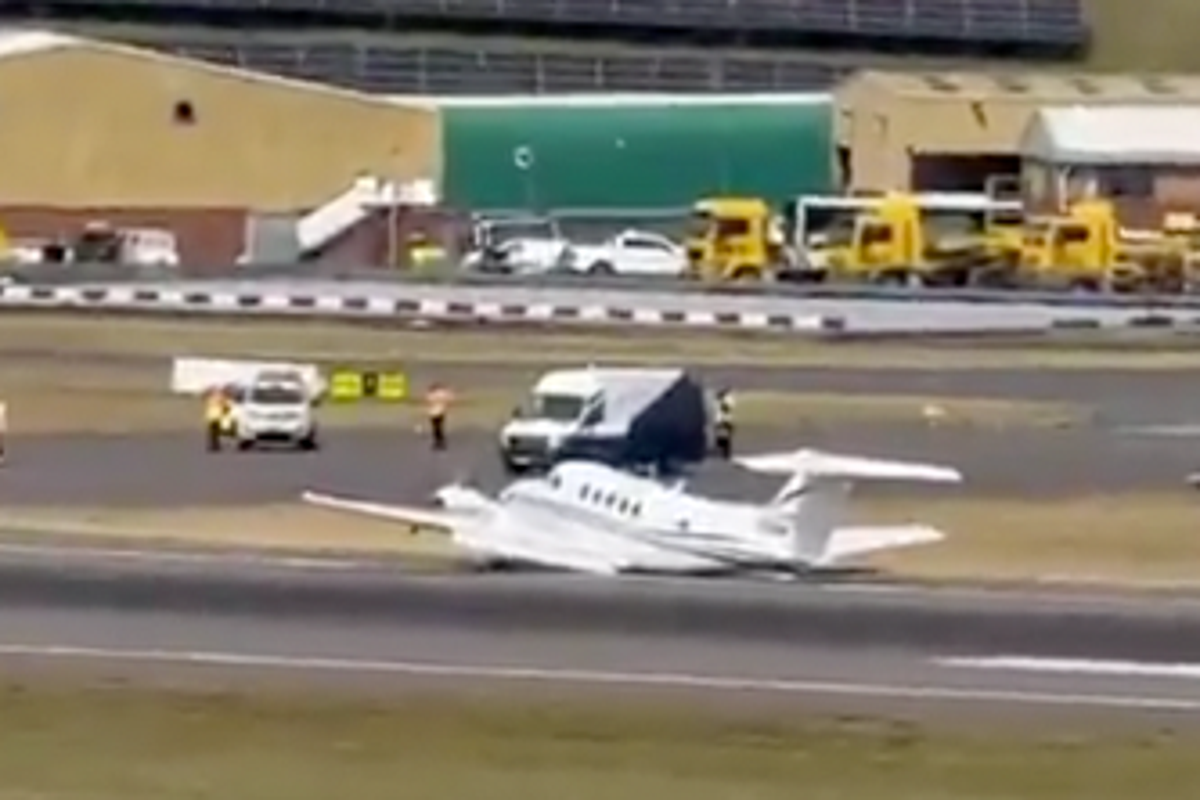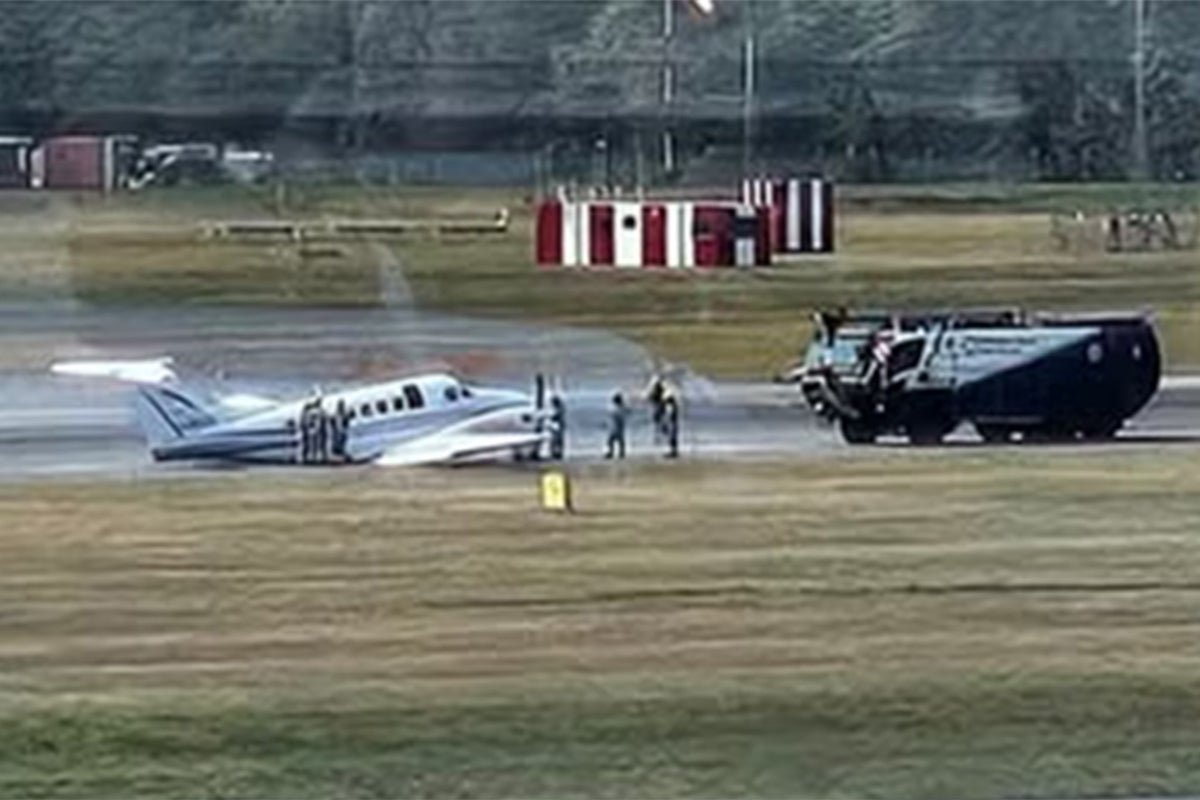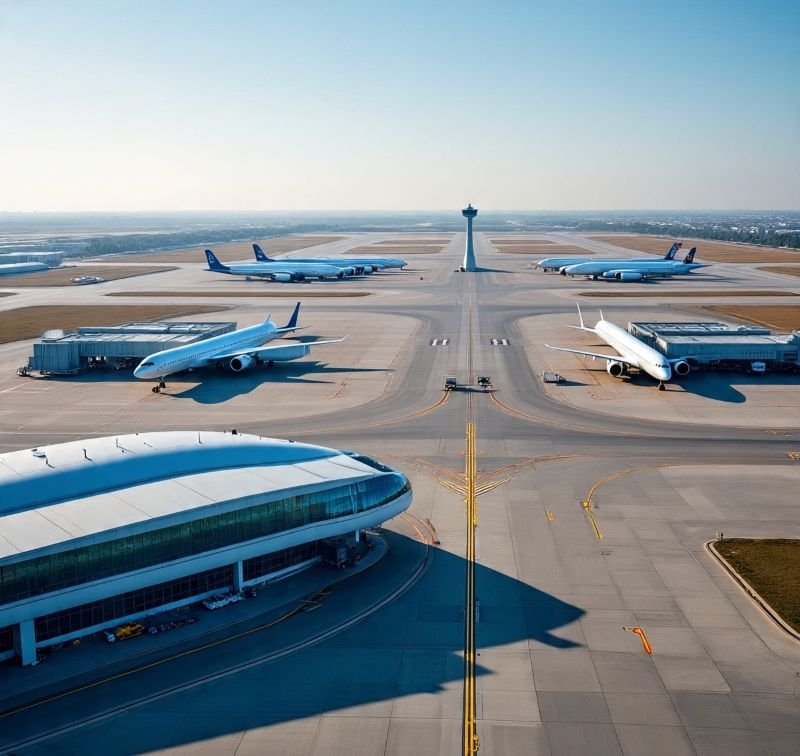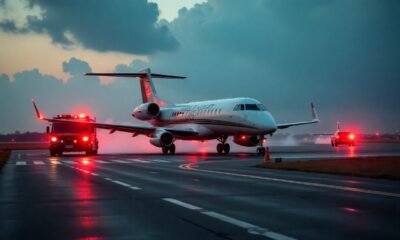Flight Buzz
How a 41-minute flight closed one of the UK’s busiest airports

Thousands of passengers are facing travel delays and disruption after all flights were suspended from Birmingham Airport due to an “aircraft incident”.
The incident is believed to have involved a light aircraft whose landing gear would not deploy as it tried to travel to Belfast around 1pm on Wednesday.
At least 18 flights have since been diverted. Birmingham Airport’s website crashed not long after passengers were told to check their flight status.
The airport, which is the UK’s seventh busiest, registered a 12 per cent increase in passenger numbers in 2024 to reach 12.85 million. It is expected that this will be the busiest ever summer for the West Midlands hub, as easyJet joins the growing number of airlines to set up base at Birmingham.
As the situation unfolds, here is what we currently know about the disruption at Birmingham Airport.
Passengers at the airport have been advised to check their flights (PA Archive)
What happened?
It is believed that the aircraft involved was a Beechcraft B200 Super King Air twin turboprop light aircraft, which belonged to Woodgate Aviation, self-described as a leading provider of corporate, business, private and general aviation services in Northern Ireland since 1969.
The flight, which is believed to have been heading to its home base of George Best Belfast City, took off at 1.16pm according to data on FlightRadar24. It climbed to 5,750 feet and almost immediately entered a holding pattern.
At 1.35pm the aircraft overflew the runway at just 300 feet, but it remains unclear if the pilot was attempting to land or enabling air traffic controllers to inspect the undercarriage. FlightRadar data shows the aircraft made contact with the ground at 1.57pm.
It is currently not known what caused the incident.
The flight appeared to overfly the runway at just 300 feet (FlightRadar24)
Is anyone injured?
One person has suffered minor injuries after the small aircraft made an emergency landing at Birmingham Airport, according to West Midlands Police.
Birmingham Airport Police said on social media: “We are at Birmingham Airport this afternoon after a small aircraft was involved in an emergency landing at around 1.40pm.
“Officers are among the emergency crews at the scene and one person has been reported to have minor injuries.
“The Civil Aviation Authority has been informed and the airport has suspended operations as an investigation is carried out.”
West Midlands Ambulance Service said three people were treated and discharged at the scene.
A spokesperson said: “We were called at 1.45pm to an incident involving a light aircraft at Birmingham Airport. Hazardous Area Response Team paramedics and three paramedic officers were sent to the scene. Upon arrival we found three patients from the aircraft, all of whom were assessed and discharged at the scene.”
One person has suffered minor injuries, according to police (SpursSingh/X)
What flights have been delayed?
The last flight to touch down before the closure was the Ryanair flight from Perpignan, which landed at 1.52pm. Two minutes later, an easyJet flight to Tenerife took off.
Incoming flights were diverted to alternative airports immediately after the runway was shut down. Here are all the diversions we are aware of so far:
-
East Midlands: Air France from Paris, Ryanair from Murcia, Jet2 from Kalamata, Preveza and Mahon, Tui from Rhodes.
-
Manchester: Jet2 from Lanzarote, Malaga and Faro, Ryanair from Bucharest, Turkish Airlines from Istanbul, Tui from Kos.
-
London Stansted: Ryanair from Malaga and Palma, Jet2 from Skiathos.Luton: Jet2 from Kefalonia, easyJet from Corfu and Heraklion.
In addition, an Aer Lingus Regional aircraft from Belfast City was about halfway across the Irish Sea when it turned back to its starting point.
The Brussels Airlines flight from the Belgian capital has been cancelled, along with the return leg from Birmingham.
Is the airport website still down?
Birmingham Airport website crashed as people flocked to check their flight status (Birmingham Airport)
Not long after Birmingham Airport advised passengers to check their flight status, the website for Birmingham Airport went down down, replaced by an error code. It remains unclear just what has happened to the online platform, but it is back up and running
What has Birmingham Airport said so far?
The airport operator announced on social media around 2.40pm that the runway was temporarily closed following an “aircraft incident”.
“Following an aircraft incident, the runway is temporarily closed,” the airport said in a statement on X posted shortly after 2.40pm on Wednesday.
“We apologise for the inconvenience this will cause.
“We will keep passengers already at the airport informed and those due to travel later today are advised to check the status of their flight before coming to the airport.
“We will continue to issue updates when we can.”
Flight Buzz
Birmingham Airport latest: Flights still disrupted after plane’s emergency landing closes runway

Full story: How a 41-minute flight closed one of the UK’s busiest airports
Athena Stavrou7 August 2025 13:32
In the UK and Europe, what can I expect if my flight is cancelled or delayed?
The Independent’s Travel Correspondent Simon Calder reports:
For delays of under two hours you have no rights (unless a short delay in the UK triggers a missed connection and much later arrival at your final ticketed destination – see below).
For longer delays, the airline should provide refreshments as appropriate after a specified length of time. This applies regardless of the cause of the delay.
The time at which the duty of care kicks in depends on the distance you are flying:
- Short flights (up to 1,500km): refreshments after two hours.
- Mid-haul journeys (1,500 to 3,500km): three hours.
- Longer trips: four hours.
Note that if the airline believes providing the care would further delay the flight, it need not deliver.
If the delay extends overnight, the airline is obliged to find and pay for a hotel room. In practice, carriers often say, “too difficult”, and invite the passenger to book their own and reclaim later.
While this practice does not comply fully with the rules, aviation authorities tend to turn a blind eye to it.
Athena Stavrou7 August 2025 13:13
Recap: How the incident at Birmingham Airport unfolded
Birmingham Airport first said at around 2.40pm that its runway was temporarily closed following the incident.
It later suggested flights would remain grounded until at least 8pm.
In an update posted on X shortly before 8pm on Wednesday evening, the airport said: “Following the aircraft incident today, the runway has reopened and operations have resumed.”
It apologised for the disruption caused by the incident and said passengers must check flight details and follow advice issued by their airlines.
Athena Stavrou7 August 2025 13:03
Watch: Simon Calder explains Birmingham Airport closure
Athena Stavrou7 August 2025 12:42
Can passengers affected claim compensation?
Thousands of airline passengers have been severely delayed by Wednesday’s incident at Birmingham Airport.
If you are flying from a UK/EU airport or on a British/ European airline and have your flight cancelled – or are delayed in arrival by at least three hours – the presumption is that you are owed hundreds of pounds in compensation.
But under air passengers’ rights rules, no compensation is payable because the cause was beyond the airlines’ control.
Athena Stavrou7 August 2025 12:27
Aircraft was also involved in crash at Southend
A Beechcraft B200 Super King Air was also involved in a plane crash at London Southend Airport in July, which killed four people on board.
Zeusch Aviation, based at Lelystad Airport in the Netherlands, confirmed its SUZ1 flight had been “involved in an accident”.
Zeusch Aviation’s website says the plane can be used for medical flights to transport patients or organs. It has also been deployed for aerial mapping flights.
Athena Stavrou7 August 2025 12:09
UK flight delays: What rights do you have to compensation for cancelled flights?
Athena Stavrou7 August 2025 11:10
Who are Woodgate Aviation?
The plane which crashed on the runway is Woodgate Aviation, self-described as a leading provider of corporate, business, private and general aviation services in Northern Ireland since 1969.
The plane was preparing to return to its home base in Belfast when things went wrong.
“The aircraft remains on the runway and Woodgate Aviation will be co-operating fully with Air Accident investigators and airport services.
“We would like to pay tribute to the professionalism of our colleagues and the emergency services at the airport for their prompt action,” Woodgate Aviation said in a statement.
Athena Stavrou7 August 2025 10:35
Passengers still stuck in Birmingham
On Thursday morning, passengers are still taking to social media to complain about the delays and cancellations.
Mike Dove wrote on X: “I should be sat on a beach in Turkey, but instead I’m sat in the Bullring still on hold to you.”
He said: “Shame on you. The incident clearly not your fault, but dealt with horrendously.”
Athena Stavrou7 August 2025 10:09
Flight Buzz
Madrid, Barcelona, Malaga, Ibiza, and Palma de Mallorca Among Spanish Airports Hit by Nationwide Baggage Handler Strikes Disrupting Flights Travelers Urged to Reassess Travel Insurance Before Flying with Ryanair All You Need to Know

Published on
August 7, 2025 |
By: TTW News Desk
Global Aviation on Alert Amid Spain’s Airport Worker Strike
It was reported that a substantial wave of travel disruption began brewing with the announcement that over 3,000 baggage handling staff in Spain would launch a long-term strike starting mid‑August, prompting widespread concern across the global aviation sector. Observers emphasized that because Spain acts as a critical European transit hub, flight schedules and international itineraries around the world were likely to be adversely affected.
Passengers traveling through Spanish airports, particularly those passing onward to other destinations, were cautioned that any operational delays in Spain could trigger cascading disruptions far beyond national boundaries. Analysts noted that this situation had the potential to derail connections, delay departures, and create knock-on effects across airlines unfamiliar with the strike’s direct involvement but reliant on Spanish ground services.
At the core of the unrest were more than 3,000 baggage handlers employed by a ground services operator. It was pointed out that disruptions to baggage processing—a seemingly behind-the-scenes operation—could have visible consequences on flight punctuality, passenger experience, and airport throughput internationally.
Strike Launches August 15 Across a Dozen Major Hubs
It was confirmed that the labour action would officially start on August 15, impacting 12 primary airports in Spain:
- Madrid‑Barajas
- Barcelona‑El Prat
- Valencia
- Seville
- Alicante
- Ibiza
- Malaga
- Palma de Mallorca
- Tenerife South
- Girona
- Lanzarote
- Santiago de Compostela
It was disclosed that the strike would unfold during three critical daily time frames: from 05:00 to 09:00, 12:00 to 15:00, and 21:00 to 23:59, aligning with peak operational windows in airport schedules. Travelers with flights during these periods were warned of elevated risk of delays and procedural slowdowns
Furthermore, sources emphasized that after the initial three days—August 15, 16, and 17—the strike would recur every Wednesday, Friday, Saturday, and Sunday until the end of 2025, transforming it from a short-lived event into a sustained challenge for airline operations and passenger movement through Spain
Underlying Causes: Workers Demand Fair Conditions
Reports indicated that the strike was the culmination of mounting frustration among ground workers over what they alleged were systemic violations of labour rights and unstable employment conditions. Unions such as UGT and CGT had pointed to coercive overtime policies, punitive disciplinary sanctions (including unpaid suspensions of up to 36 days) for refusing extra hours, and a lack of consolidated schedules for part-time staff as key grievances
Union leaders argued that these practices created insecurity and disregard for existing labour agreements governing pay, scheduling, and job stability. The action, they insisted, was intended to force meaningful negotiation toward improved, lawful working conditions for more than 3,000 employees nationwide
Passenger Impact: Delays, Baggage Mix‑ups, and Itinerary Chaos
Travel experts and union statements both acknowledged that even though minimum service levels would legally remain in force, the repeated, large‑scale stoppages during critical hours were expected to cause major slowdowns. Baggage processing backlogs, slower aircraft turnarounds, and check-in delays were all flagged as probable consequences
Passengers were urged to avoid checking luggage where possible, with carry‑on only travel offering the most reliable way to reduce exposure to lost or delayed baggage. Lessons drawn from past incidents—including luggage not arriving for days—reinforced this advice
Travelers were also reminded of compensation rights under EU 261/UK 261, which may apply if flight delays exceed three hours—unless the strike is deemed an extraordinary circumstance. In previous rulings, strikes by subcontracted ground workers had not automatically exempted airlines from compensation responsibilities, suggesting that passengers could have strong grounds for reimbursement if flights were delayed or cancelled
Insurance and Policy Caveats: What Everyone Must Check
It was noted that most standard travel insurance policies did not automatically cover industrial action unless explicitly included as an add-on or higher-tier benefit. Travelers were strongly advised to review their policy terms carefully to determine whether strike disruption, missed connections, or overstays due to delays were included in coverage.
Important points to confirm included:
- Whether the strike classifies as a “known event” at the time of purchase—policies often exclude coverage for events that were public knowledge at purchase.
- Whether missed departures, accommodation costs, or alternative transport expenses were incorporated.
- Whether the policy clearly covers industrial action and includes provisions for extended delays, stranded travellers, or rebooking costs.
Travelers who had already booked were encouraged to contact their airline immediately to ask about rebooking, alternate routing, or compensation options. Those planning trips ahead were urged to select policies with disruption add-ons and to retain all receipts for potential claims. Adjusting to avoid strike days or hours, if feasible, was highlighted as a practical strategy to limit risk.
Wider Effects on Season‑Long Tourism
Given the strike’s scheduled continuation through 30 December 2025, its impact was projected to extend well beyond the summer holiday season into autumn, winter, and even early 2026. Major airports, particularly Madrid, Barcelona, and Palma de Mallorca, were expected to bear the brunt of ongoing disruption
Some industry analysts predicted that frustrated travelers might reroute through alternate airports in neighboring countries, shifting tourism flows and putting additional strain on airports without the infrastructure to handle sudden surges. Such changes could also impact booking patterns, accommodation demand, and the overall mood around travel to Spain.
Recommendations for Travelers Leaving Soon
It was suggested that passengers with travel plans involving any of the listed Spanish airports take specific steps to minimize inconvenience:
- Verify coverage for strike-related disruptions in insurance policies immediately.
- Understand the definition of a “known event” within the policy terms, which can affect eligibility.
- Contact your airline early to confirm options for rebooking or compensation.
- Document always unforeseen costs such as extra hotels, meals, or transport.
- Where possible, book flights outside of strike windows—especially avoiding check-in and baggage during the outlined timeframes.
These precautions were considered essential for maintaining control over potentially chaotic travel experiences, reducing both stress and financial exposure.
Portable Luggage, Delays, and Destination Confidence
Industry voices pointed out that travelers who strictly packed carry‑on only stood the best chance of avoiding delay issues tied to lost or held luggage. Reddit users recounted stories of unchecked bags failing to arrive for days during similar stoppages, underscoring the wisdom of securing essentials aboard one’s person
If disruptions grew persistent, it was forecast that tourist confidence in Spain—notably during busy seasons—could decline. Some vacationers might redirect plans to destinations perceived as more stable. This shift could erode demand in regions like Barcelona, Malaga, Ibiza, and the Balearics, prompting local tourism services to adapt quickly to reduced footfall or altered timing of arrivals.
Economic and Operational Ramifications Across the Industry
Travel analysts emphasized that the ripple effects of the strike would affect not only individual travelers but also industry operations and revenue flows. Airlines might need to reschedule flights, adjust turnarounds, and allocate additional buffer time between connections to compensate for slower baggage handling.
Airport infrastructure could face bottlenecks, particularly in shared areas where multiple airlines used the same cargo belts or ramp equipment—delays in one zone could cascade into adjacent terminals. Ground‑handling limitations could create aircraft stacking, queueing issues, and delays impacting on-time performance metrics.
Tourism providers—hotels, restaurants, local attractions—might see changes in arrival times, cluster demand shifts, and increased customer service queries. The need for transparent communication and flexibility became paramount for service providers in retaining traveler trust.
The Underlying Story: Workers With Grievances Demand Change
As coverage made clear, labor representatives detailed several reasons behind the escalation, including alleged imposition of overtime hours without consent, disciplinary actions for signing off from mandated extra shifts, lack of transparent bonus and compensation structures, and restrictions on returning to work post‑medical leave.
Unions had demanded that sanctions be lifted, work conditions formalized, and meaningful negotiations initiated to improve contracts for over 3,000 employees across Spain. The failure to engage meaningfully was stated as a key reason the fourth quarter 2025 strikes remained scheduled
How the Travel Industry Must React
Travel industry leaders were urged to:
- Closely monitor the transport ministry’s declaration of minimum service levels, which under Spanish law would determine how many operational functions must continue even during strikes.
- Communicate clear guidance to travelers about arrival advisories, check-in times, and compensation rights, especially in the context of EU 261 and UK equivalents.
- Prepare contingency staffing and logistics adjustments to soften potential knock-on effects, such as deploying mobile stairs or reassigning baggage equipment.
- Advise passengers to build in extra time for connections through Spanish airports, or offer alternative routes where possible.
Such preparation was considered essential to mitigate the strike’s impact and preserve booking confidence during volatile travel windows
The Bigger Picture: A European Strike Trend?
It was remarked that this strike in Spain reflected a broader wave of labour unrest in the aviation sector across Europe, where increasing staff shortages and rights disputes were pushing unions into action. This trend suggested that similar disruptions could arise elsewhere, making proactive planning critical for travel stakeholders and holiday planners alike.
Final Reflection
It was underscored that the unfolding ground‑handling strike in Spain—spanning dozens of weekends and peak travel slots—reflected more than a personnel dispute; it symbolized a deeper fracture in operational trust and worker rights frameworks.
Travelers, airlines, and hospitality providers were encouraged to:
- Stay informado and monitor how the strike evolves through December 2025.
- Promote flexibility in itineraries and encourage insurance with disruption coverage.
- Leverage communication to maintain customer confidence, especially when compensating for delays or rebooking.
Despite its projected duration, it was suggested that with careful planning and transparency, the disruptions could be managed well enough to preserve travel experiences worldwide—even in the face of one of the most prolonged airport workforce actions of recent memory.
Highlights to Remember:
- Over 3,000 baggage handlers across Spain are involved in the strike.
- Strikes commence on 15 August 2025, covering 12 major airports, including Madrid, Barcelona, Valencia, Seville, and Palma de Mallorca.
- Work stoppages occur during 05:00–09:00, 12:00–15:00, and 21:00–23:59, then repeat Wednesday, Friday, Saturday, and Sunday through the end of 2025.
- Travelers are urged to verify travel insurance coverage, particularly for industrial action or known events.
- Carry‑on only travel is recommended to minimize risk of lost or delayed baggage.
- The strike is likely to cause global flight ripple effects, with potential tourism shifts away from Spain, as holiday plans adapt.
- Industry stakeholders should plan proactively, update passengers, and adapt logistics to maintain service in turbulent conditions.
Flight Buzz
Delta Passenger Asleep on Flight, Anger at What Woman Does on Next Seat

A Delta Air Lines passenger joining a Microsoft Teams call during an early morning flight has prompted criticism on Reddit.
The incident was detailed in a post titled, “New absurd behavior: Teams meeting from flight,” shared by Reddit user u/br0princess on August 4 in the r/delta subreddit.
The post described a woman who disrupted the quiet cabin during a flight from San Francisco International Airport (SFO) to Hartsfield-Jackson Atlanta International Airport (ATL). The poster, who did not share their name or age, told Newsweek: “I was sitting in the main cabin” and the “flight was full.”
“Flying SFO to ATL on the 6:15 a.m., so we all clearly got up early to make the flight,” the user wrote in the post. “I’m prepared to catch some more sleep with my neck pillow, eye mask, and earplugs.”
That plan was upended, the poster explained, when the woman seated next to them began speaking loudly during a video call. “At 8:30 a.m. PT [Pacific Time] this woman next to me wakes me up from TALKING on her Teams meeting, on camera,” the user wrote. “I can tell someone on the meeting was shocked that she joined given that she’s obviously on plane. She goes ‘But it was an important meeting!!!!! I didn’t want to miss it.'”
The poster told Newsweek that the woman wore headphones and only spoke at the start of the call to say she’d keep her camera off. “She didn’t speak again but she did stay on the call to watch her coworkers on the meeting, screen share and take notes/listen…”
The Reddit post quickly gained traction, with 4,400 upvotes and hundreds of comments. It sparked a wide-ranging conversation about in-flight internet etiquette and passenger behavior.
“If it was that important,” the original poster continued. “Maybe don’t fly during your In Person Account Meeting to review your marketing statistics for your client?…I’m FUMING. People have lost their damn minds and basic courtesy.”
Getty
According to the Delta website, free Wi-Fi is available for SkyMiles members on most domestic flights and “once you are connected to Wi-Fi, you can message using messaging apps such as iMessage, Facebook Messenger or WhatsApp on compatible devices.” However, the airline does not specify any guidelines for taking calls on board.
While the U.S. Federal Aviation Administration (FAA) has permitted the use of portable electronic devices during flights since 2013, the rules around voice calls and video conferencing are unknown.
Back in October 2013, the U.S. Federal Aviation Administration (FAA) announced that “airlines can safely expand passenger use of Portable Electronic Devices during all phases of flight” and “most commercial airplanes can tolerate radio interference from portable electronic devices.”
While it’s safe to read downloaded materials, such as e-books and calendars, and to play games, “in some instances of low visibility—about one percent of flights—some landing systems may not be proven to tolerate the interference,” the FAA said, advising that “in those cases, passengers should be asked to turn-off devices.”
While connectivity may be technically safe, airlines and social norms still frown upon disruptive in-flight behavior—especially during early morning flights when many passengers are trying to rest.
The Reddit user told Newsweek: “I did tell her that the call wasn’t allowed, she claimed she didn’t know, even though it was announced at the start of the flight. I told a flight attendant walking past us and the flight attendant told her to stop. She did not and continued to sit on the call.”
The poster then asked the woman to get up and then went to speak with a flight attendant about her again. “She was told she’d get written up if she stayed on the meeting and she said she was only working, not on a meeting,” the poster noted.
“Nothing really came of it,” the poster said. “The part that upset me the most was that she spoke loudly and woke me up on an early morning flight to do something that was prohibited…”
Several Reddit users expressed sympathy with the original poster.
“FA [flight attendant] here: Please ring your call light. I will shut that nonsense down,” wrote user u/Cassie_Bowden in response.
Another commenter, u/New-Reference-2171, agreed: “I came to say this—ring your call button.”
Others were baffled by the woman’s decision to conduct an audible, on-camera meeting mid-flight. “I truly don’t know how all of you stand the entitled people who do this,” wrote u/vampyire.
User u/rando435697 added: “That’s incredibly bizarre behavior by her…for me, I’ve joined meetings in flight, however, I’ve shared in advance with my team that I was going to be on a flight, I’d be off camera and listening in only. Being active and potentially giving away sensitive information—not to mention disturbing other passengers, is just unhinged and wildly inappropriate.”
Newsweek has contacted Delta Air Lines for comment via email.
Do you have a travel-related story to share? Let us know via life@newsweek.com and your story could be featured on Newsweek.
-

 Brand Stories2 weeks ago
Brand Stories2 weeks agoBloom Hotels: A Modern Vision of Hospitality Redefining Travel
-

 Brand Stories2 weeks ago
Brand Stories2 weeks agoCheQin.ai sets a new standard for hotel booking with its AI capabilities: empowering travellers to bargain, choose the best, and book with clarity.
-

 Destinations & Things To Do3 weeks ago
Destinations & Things To Do3 weeks agoUntouched Destinations: Stunning Hidden Gems You Must Visit
-

 Destinations & Things To Do2 weeks ago
Destinations & Things To Do2 weeks agoThis Hidden Beach in India Glows at Night-But Only in One Secret Season
-

 AI in Travel3 weeks ago
AI in Travel3 weeks agoAI Travel Revolution: Must-Have Guide to the Best Experience
-

 Brand Stories1 month ago
Brand Stories1 month agoVoice AI Startup ElevenLabs Plans to Add Hubs Around the World
-

 Brand Stories4 weeks ago
Brand Stories4 weeks agoHow Elon Musk’s rogue Grok chatbot became a cautionary AI tale
-

 Brand Stories2 weeks ago
Brand Stories2 weeks agoContactless Hospitality: Why Remote Management Technology Is Key to Seamless Guest Experiences
-

 Asia Travel Pulse1 month ago
Asia Travel Pulse1 month agoLooking For Adventure In Asia? Here Are 7 Epic Destinations You Need To Experience At Least Once – Zee News
-

 AI in Travel1 month ago
AI in Travel1 month ago‘Will AI take my job?’ A trip to a Beijing fortune-telling bar to see what lies ahead | China





You must be logged in to post a comment Login